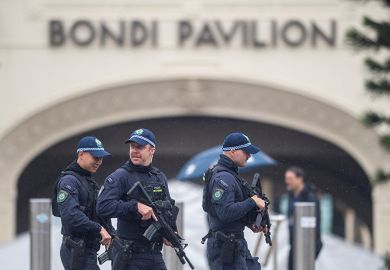Universities must take a bottom-up and flexible approach to protecting academics travelling overseas, according to scholars who have claimed that some institutional processes designed to mitigate risks ended up causing more harm.
Ilyas Saliba, a research fellow at the WZB Berlin Social Science Center and the Global Public Policy Institute, said research institutions should acknowledge that they “have not invested enough in preparing researchers with regards to fieldwork safety” in comparison with other sectors, such as humanitarian aid, human rights or journalism, noting that PhD students received “barely any courses or advice” on research safety or digital security.
But he added that academia should “resist a creeping securitisation of fieldwork under the pretext of liability and duty of care obligations” and “instead focus on enabling researchers to professionally analyse and mitigate risks associated with their fieldwork. This would allow us to avoid contributing to restricting academic work while at the same time making fieldwork research safer.”
Speaking during a Universities UK conference, Security and Risk Management in Higher Education: Protecting Universities from Hostile Actors, Mr Saliba warned that some obligatory requirements from institutions, often imposed for legal reasons, put researchers conducting fieldwork or their research subjects at more risk.
“Signed consent forms for qualitative interviews with at-risk populations in authoritarian contexts put the researcher, and the interviewee, at risk” because these papers could be seen by security forces at airports or checkpoints, he said, adding that oral consent should be enough and posed a much lower risk.
Meanwhile, risk assessments often required academics to have a visa arranged before travelling, but research visas can be riskier than tourist visas, Mr Saliba said.
“There we need institutional flexibility, and we need openness from both sides to discuss [what is] legally a grey zone,” he added.
Mr Saliba also called for universities to have designated laptops, phones and equipment for fieldwork so there was no stored data on them relating to the researchers themselves or the people they interacted with.
Last month, UUK published new guidance to British universities on how to manage risks in internationalisation, including tackling foreign interference and promoting academic freedom.
Berit Bliesemann de Guevara, professor in international politics at Aberystwyth University and co-author of the recent book Doing Fieldwork in Areas of International Intervention, said many UK universities could improve their duty of care for research staff and students travelling abroad but they had to take a context-specific and “bottom-up approach, involving those researchers affected by policies and processes” as well as regional experts in-house or at other universities or organisations.
She also warned against relying on panels of researchers from across different disciplines to assess risks as “the risks they are discussing will be quite different”.
“It’s not clever to have these overarching bodies – they can ask the questions, but they shouldn’t impose what the answers are. The answers have to be more informed by those with more expertise in the specific problems that arise.”
Professor Bliesemann de Guevara added that risk assessments should be treated as “living documents and ongoing tasks before and during the research, and not as tick-box exercises”.
“The focus should be on asking the right questions and supporting researchers in answering them rather than imposing restrictions on research,” she said.
Register to continue
Why register?
- Registration is free and only takes a moment
- Once registered, you can read 3 articles a month
- Sign up for our newsletter
Subscribe
Or subscribe for unlimited access to:
- Unlimited access to news, views, insights & reviews
- Digital editions
- Digital access to THE’s university and college rankings analysis
Already registered or a current subscriber?








